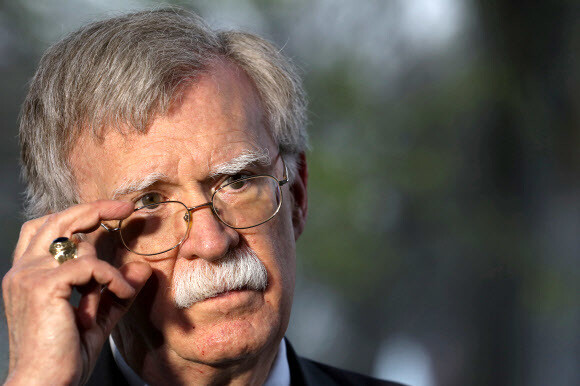hankyoreh
Links to other country sites 다른 나라 사이트 링크
Bolton says 6-Party Talks not the US’ preferred method to resolve NK nuclear issue

On Apr. 28, White House National Security Advisor John Bolton flatly stated that the Six-Party Talks, which were recently mentioned by Russian President Vladimir Putin as a way to resolve the North Korean nuclear issue, are not the method preferred by the US. Bolton’s remarks were apparently aimed at keeping a discussion about the Six-Party Talks from spreading and at preventing Russia and other neighboring countries from intervening in the North Korean nuclear issue. Russia has notably underlined its stake in the North Korean issue, which it describes as a “critical issue in the region.”
When asked during an interview on Fox News Sunday whether US President Donald Trump supports resuming the Six-Party Talks as Putin proposed following his recent summit with North Korean leader Kim Jong-un, Bolton said that the Six-Party Talks are not the US’ preference, while noting that the US does not mean to exclude neighboring countries.
“Kim Jong-un, at least up until now, has wanted the one-on-one contact with the United States, which is what he has gotten,” Bolton added.
Bolton explained that the Six-Party Talks approach had failed in the past, but added that “that doesn’t mean we don’t consult” other countries. These remarks hint at the approach preferred by the mainstream in the US government: focusing on one-on-one talks with North Korea while sidelining Korea’s neighbors on the denuclearization issue.
When Chris Wallace, host of Fox News Sunday, asked whether Putin was helping with the denuclearization process, Bolton said, “I think both Russia and China could tighten up their enforcement of the sanctions.” These remarks appear aimed at limiting the role of Russia, which has asserted its role as another messenger for North Korea following Putin and Kim’s summit, to implementing sanctions on the North and strengthening their enforcement of those sanctions. “Bolton was basically putting a preemptive check [on North Korea],” said a diplomatic source who is familiar with North Korea-Russia relations.
On the other hand, Russia has been taking steps to be more involved in Korean Peninsula issues since the North Korea-Russia summit. “For us, North Korea is a neighboring country. We have a common border and when we deal with North Korea we are acting in our home region,” Kremlin Press Secretary Dmitry Peskov said during an interview on the "Moscow. Kremlin. Putin" program on the Rossiya-1 television channel, according to TASS and other Russian media.
“When the [Americans] deal with North Korea they are acting in our region, not [theirs],” Peskov also said. Russia is apparently emphasizing that it’s one of the major countries connected to the North Korean nuclear program and other issues related to the North.
“Russia doesn’t seem very inclined to make a splash by defecting from the international sanctions regime. So far, both Russia and North Korea only seem intent on flaunting political symbolism,” another diplomatic source said.
In related news, TASS reported on Apr. 29 that Putin asked the Ministry for the Development of the Russian Far East to analyze a project to build an automobile bridge across the border with North Korea, a matter that was apparently discussed during his summit with Kim.
By Hwang Joon-bum, Washington correspondent, and Kim Ji-eun, staff reporter
Please direct comments or questions to [english@hani.co.kr]

Editorial・opinion
![[Editorial] Intensifying US-China rivalry means Seoul must address uncertainty with Beijing sooner than later [Editorial] Intensifying US-China rivalry means Seoul must address uncertainty with Beijing sooner than later](https://flexible.img.hani.co.kr/flexible/normal/500/300/imgdb/original/2024/0517/8117159322045222.jpg) [Editorial] Intensifying US-China rivalry means Seoul must address uncertainty with Beijing sooner than later
[Editorial] Intensifying US-China rivalry means Seoul must address uncertainty with Beijing sooner than later![[Column] When ‘fairness’ means hate and violence [Column] When ‘fairness’ means hate and violence](https://flexible.img.hani.co.kr/flexible/normal/500/300/imgdb/original/2024/0516/7417158465908824.jpg) [Column] When ‘fairness’ means hate and violence
[Column] When ‘fairness’ means hate and violence- [Editorial] Yoon must stop abusing authority to shield himself from investigation
- [Column] US troop withdrawal from Korea could be the Acheson Line all over
- [Column] How to win back readers who’ve turned to YouTube for news
- [Column] Welcome to the president’s pity party
- [Editorial] Korea must respond firmly to Japan’s attempt to usurp Line
- [Editorial] Transfers of prosecutors investigating Korea’s first lady send chilling message
- [Column] Will Seoul’s ties with Moscow really recover on their own?
- [Column] Samsung’s ‘lost decade’ and Lee Jae-yong’s mismatched chopsticks
Most viewed articles
- 1Celine Song says she’s gratified global audiences have responded to the kismet of ‘inyeon’
- 2[Editorial] Transfers of prosecutors investigating Korea’s first lady send chilling message
- 3[Exclusive] Unearthed memo suggests Gwangju Uprising missing may have been cremated
- 4For new generation of Chinese artists, discontent is disobedience
- 5Xi, Putin ‘oppose acts of military intimidation’ against N. Korea by US in joint statement
- 6Highly educated high-earners at risk of being replaced by AI, BOK study says
- 7[Column] US troop withdrawal from Korea could be the Acheson Line all over
- 8USFK sprayed defoliant from 1955 to 1995, new testimony suggests
- 9Japan begins dumping irradiated Fukushima water amid outpouring of concern about vague timeline
- 10Why Kim Jong-un is scrapping the term ‘Day of the Sun’ and toning down fanfare for predecessors